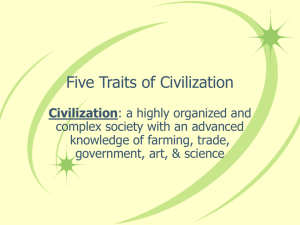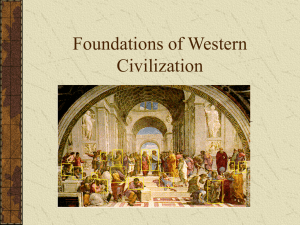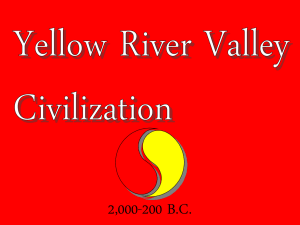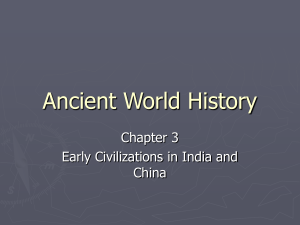Document
advertisement
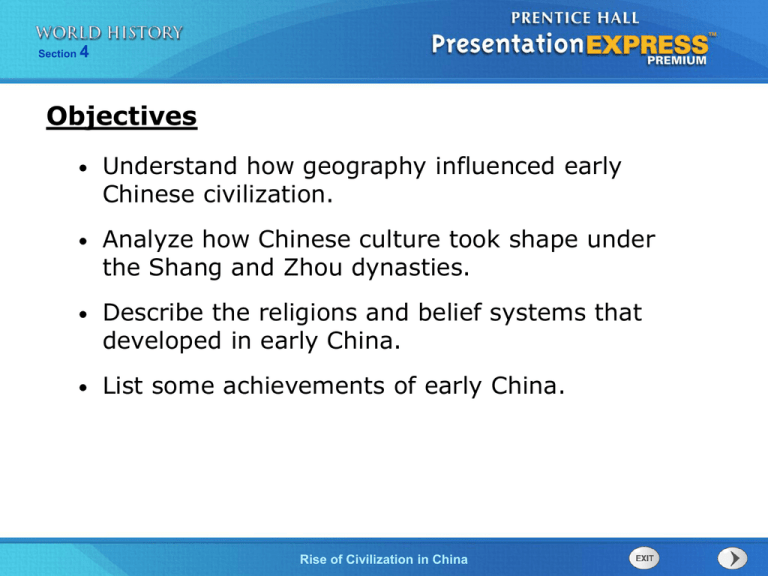
Section 4 Objectives • Understand how geography influenced early Chinese civilization. • Analyze how Chinese culture took shape under the Shang and Zhou dynasties. • Describe the religions and belief systems that developed in early China. • List some achievements of early China. Rise of Civilization in China Section 4 Terms and People • loess – fine yellow windblown soil • clan – a group of families that share a common ancestor • dynastic cycle – the rise and fall of dynasties • feudalism – a system of government in which local lords governed their own lands but owed military service and other forms of support to the ruler • Confucius – a Chinese philosopher who focused on good government and social order Rise of Civilization in China Section 4 Terms and People (continued) • Laozi – a Chinese philosopher who emphasized living in harmony with nature • philosophy – a system of ideas • filial piety – respect for parents • oracle bone – animal bone on which Shang priests wrote questions addressed to the gods or to the spirit of an ancestor • character – a written symbol • calligraphy – the art of producing beautiful handwriting Rise of Civilization in China Section 4 What characteristics defined the civilization that developed in China under its early rulers? During China’s long history, two themes played key roles: • Dependence on rivers for transportation and irrigation • Devotion to duty to ensure that society operates smoothly Rise of Civilization in China Section 4 Geography influenced Chinese civilization by isolating it from outside people. The Gobi desert, the Himalayan mountains, thick rainforests, and the Pacific Ocean all set China apart. Rise of Civilization in China Section 4 Chinese civilization began in the valleys of the Huang and Chang rivers. • Beyond this heartland were regions with harsher climates, occupied mostly by nomads, who sometimes attacked Chinese cities. • When outsiders invaded, Chinese civilization often absorbed them. Rise of Civilization in China Section 4 The Huang River valley provided the fertile soil Neolithic people needed to farm. • The Huang is also known as the Yellow River, because of the volume of yellow loess soil that washed into its waters. • The river got the nickname “River of Sorrows” because it often overflowed. Rise of Civilization in China Section 4 The first Chinese dynasty, the Shang, arose around 1766 B.C. and lasted until 1122 B.C. • The dynasty was organized by clans. • Most members of Shang society were peasants who led grueling lives working the fields. • The cities supported artisans skilled in bronze work. Rise of Civilization in China Section 4 The Shang dynasty ended in 1122 B.C. in a rebellion led by two Zhou warriors. The Zhou claimed a divine right to rule, calling it the Mandate of Heaven. Rise of Civilization in China Section 4 Later, the Chinese argued that the dynastic cycle reflected heaven’s judgment of good and bad governments. Rise of Civilization in China Section 4 Under the Zhou dynasty, China became a feudal state. Feudalism was a system in which local lords governed their own lands, but owed military service to the ruler. After 800 B.C., feudal lords had more power than Zhou kings. Rise of Civilization in China Section 4 By the time of the Shang dynasty, the Chinese had developed complex religious beliefs. • Many of these beliefs were practiced for thousands of years • They prayed to many gods and nature spirits. They called on their ancestors for good fortune and made offerings such as food to influence gods such as the great Shang Di. Rise of Civilization in China Section 4 Confucius developed his philosophy during the Zhou period. Concerned with worldly goals, he considered filial piety, respect for parents, the highest principle. His teaching reflected Chinese belief in yin and yang, balance between two forces. Rise of Civilization in China Section 4 Laozi lived at the same time as Confucius and founded a philosophy called Daoism. Rise of Civilization in China Section 4 The Shang and Zhou periods produced many cultural achievements. • The Chinese learned to make silk by 2640 B.C. It became their most valuable export. • Chinese writing appeared 4,000 years ago on oracle bones. • Chinese writing became the art form calligraphy. Rise of Civilization in China Section 4 Chinese writing fostered unity among diverse peoples. Under the Zhou, the first books were made. One them, The Book of Songs, depicted both farm and royal life in poetry and song. Rise of Civilization in China Section 4 Section Review QuickTake Quiz Know It, Show It Quiz Rise of Civilization in China



